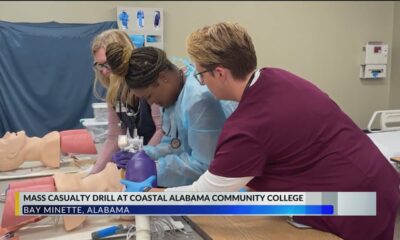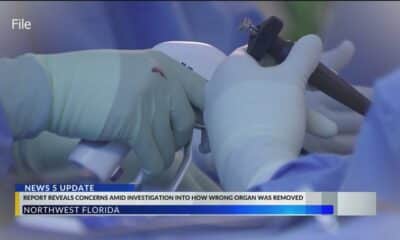Mississippi News
Transplant candidates with Blue Cross impacted by insurance dispute
Need an organ transplant in Mississippi? You may be out of luck thanks to an insurance dispute.
One day in early 2020, a Madison man noticed blood in his mouth. His symptoms escalated, and by the end of that week, he was in the intensive care unit at Merit Health Madison. When he woke up from a procedure, the gastroenterologist told him his liver was in bad shape.
He had end-stage liver disease, and the only treatment option was a liver transplant.
The next two years consisted of a double hip replacement, numerous procedures on his esophagus and visits with an array of specialists, including psychologists. He started a special diet and followed the rules his doctors gave him. He did all of this to become eligible as a transplant candidate at the University of Mississippi Medical Center, which houses the state’s only organ transplant program.
In January of this year, he got the bittersweet call: his liver had worsened, and he was now on the transplant list.
“The liver problem is not something that is linear, it’s exponential. It doesn’t just progressively get worse – it’s one day you’re toddling along doing pretty well, then boom, you can fall off the cliff, and the liver goes bad overnight,” said the man, who did not want his name printed over fear of retaliation and privacy concerns.
But after all that work and waiting, he, along with all Mississippians with Blue Cross & Blue Shield insurance who are on the transplant list at the University of Mississippi Medical Center, is now ineligible to receive an organ as long as the hospital is out of network with the insurer.
UMMC, the state’s largest hospital and only academic medical center, went out of network on April 1 with Blue Cross & Blue Shield of Mississippi, the state’s largest insurer. UMMC asked for higher reimbursement rates for its services and disagreed with the company’s quality care plan, which measures hospital performance and whether services provided to patients are adequate.
Mississippi has the lowest reimbursement rate from commercial insurance companies for inpatient services in the nation, according to a 2021 white paper by the actuarial and consulting firm Milliman. The outpatient reimbursement rates are also low compared to the rest of the country.
Blue Cross balked at the hospital’s proposal, and tens of thousands of Mississippians were left to face higher out-of-pocket medical expenses or find care elsewhere. UMMC has the state’s only organ transplant center in addition to the only children’s hospital, Level I trauma center, Level IV neonatal intensive care unit and other advanced specialties.
Adults and children with Blue Cross insurance represent about 10% of the transplants done each year, according to UMMC officials. They are not considered under the “continuity of care” obligation, which requires the hospital to honor in-network insurance rates for certain patients until June 30. UMMC officials say this is because a transplant recipient’s care extends far beyond 90 days and requires a lifelong prescription of expensive immunosuppressant drugs.
“We’re still looking at the legal issues and the authority we have to try and bring a settlement about between the parties,” said Mike Chaney, the state commissioner of insurance, when asked about the dispute’s impact on organ transplant candidates.
READ MORE: UMMC goes out-of-network with Blue Cross Blue Shield
The liver transplant candidate moved to the metro area in 2019 to access better medical care for problems stemming from a serious car accident. He was diagnosed with liver disease in 2020 and found out UMMC’s program was listed in the top three in the country by the Scientific Registry of Transplant Recipients. He was relieved he’d be able to access this life-saving care from a nearby – and esteemed – provider.
The call that a liver was ready could come anytime of the day or night, and he needed to have a bag packed and always stay within a one-hour drive of the hospital, his care team told him. He should self-monitor and report any changes or issues to his doctors immediately.
But the first week of this month, the transplant coordinator called him.
“They said, ‘Your insurance is not willing to pay,’” he recalled. He first understood them to say he had been removed from the list entirely, but later clarified he had been put on “hold” – meaning if his perfect organ became available, he wouldn’t be getting it at UMMC.
Marc Rolph, executive director of communications and marketing at UMMC, said the process of placing potential transplant recipients on hold, or marking them as “inactive,” due to insurance changes is not new.
“There are cases where somebody has insurance (we accept), they get on the (transplant) list and change their insurance to one that we’re not in network with,” he said.
Rolph said if and when UMMC returns to being in network with the insurance company, the hold on the patient is lifted.
“So you’re still on the list, you haven’t lost your spot,” he said.
When an organ becomes available — a rare occurrence in itself because of the small percentage of people who are on ventilators before they die — a match is found through a complex database of candidates maintained by the United Network for Organ Sharing. The match is based on a variety of characteristics of both the donor and the recipient, including blood type, medical urgency and the location of the transplant hospital.
But as long as UMMC remains out of network with Blue Cross, patients with Blue Cross who are only on UMMC’s transplant list won’t be notified if a compatible organ becomes available. Instead, it would go to another candidate, or potentially no one at all.
Officials at Blue Cross & Blue Shield of Mississippi call the move “heartless” and say transplants is one of the areas where it offered UMMC an increase in reimbursement when the hospital and insurer were attempting to negotiate their contract.
“Most of these patients have been treated by UMMC for some time and their relationship with their UMMC physician is being disregarded by these tactics,” said Cayla Mangrum, manager of corporate communications for Blue Cross & Blue Shield of Mississippi. “UMMC’s reimbursement for transplants is fair and equitable and based on regional data.”
But Dr. Alan Jones, associate vice chancellor for clinical affairs for UMMC, said Blue Cross is not telling the whole story. There was one area of transplant the insurer did offer a minimal increase, but it was offset by reductions in other areas of transplant, he said.
Details of existing contracts and negotiations between insurers and hospitals, even those that are state-funded, are not public record.
Chuck Stinson of the Mississippi Organ Recovery Agency, the state’s organ procurement agency that raises awareness about organ, eye and tissue transplantation, declined to comment on the issue.
The UMMC patient scrambled to find a solution after getting the call. He talked to Blue Cross & Blue Shield of Mississippi representatives, who he says are encouraging him to get on the list at Methodist Transplant Institute in Memphis.
The insurance company doesn’t seem to understand the complicated, involved process of getting evaluated and the challenges of getting care three hours away, he said.
“She (Blue Cross adult case manager) just said ‘Oh, you’ll just go up there and get evaluated,’ and I said, ‘Ma’am, it’s not that simple.’ It was four months (of evaluation) at UMMC,” he said. “And who’s going to pay for me to go back and forth to Memphis? I don’t know a soul in Memphis.”
And because transplant programs have differing criteria for candidates, there’s no guarantee he would be accepted there. Some require a certain MELD (Model for End-Stage Liver Disease) score to qualify. Others only allow a candidate to be on the transplant list at one facility, while others allow candidates to be on multiple lists.
“What if I don’t qualify after I go to Memphis and spend all that time and money? What if, for some reason, they just don’t like a guy that looks like me?” he said.
And because some insurance plans have coverage limits, people who go through multiple evaluations at different hospitals may exceed their limit and face expensive medical bills.
He is waiting on a cost estimate from UMMC of what the transplant would cost in hopes Blue Cross agrees to pay some of it. But because UMMC has said it will not accept any payments from Blue Cross, it’s unknown whether any payment agreement can be reached.
The average total cost of a liver transplant is $878,400, including costs of care the month before surgery and six months’ of care post-surgery, according to a summary of estimated organ transplant costs for 2020.
“We have a transplant member who inquired about paying the difference in what UMMC may bill, if the benefit payment was made to the member, and requested what information they need to give UMMC,” said Mangrum said in an email when Mississippi Today asked if such an arrangement would be allowed. “Our case manager continues to work with the member.”
Officials at the hospital and insurance company each point the finger at the other when asked about the sometimes life-and-death effects this contract dispute is having on UMMC patients.
“We understand that some Members may not want to go out of state for their transplant – but it is UMMC that is refusing to care for them,” Mangrum said.
Jones said he hopes Blue Cross “sees the value” of the state’s only organ transplant program and UMMC as a whole.
“We are disheartened that patients with whom we’ve already established a relationship may have to make the difficult decision to get on a transplant list at another facility. We certainly wish they weren’t faced with that process, which can sometimes take multiple in-person visits with a hospital’s transplant program coordinators and surgeons,” said Jones. “We believe it is best for Mississippians who need a life-saving organ transplant to receive it here in their home state.”
This patient said while the situation has been stressful, he’s been able to remain calm. What really gets to him, he says, is thinking about children in his same predicament.
Liver transplant recipients can live a good 30 years, he’s heard.
“At my age, I probably don’t have 30 years left, even with a great liver. But a child that is sick and has a bad MELD (Model for End-Stage Liver Disease) score – a transplant could create 30 more years of healthy living (for them),” he said. “They’ve got their whole lives in front of them. It’s just sad to try to even comprehend that any person or organization would stand in the way of that.”
This article first appeared on Mississippi Today and is republished here under a Creative Commons license.
Mississippi News
Ole Miss women get pair of double-doubles and roll to 83-65 March Madness win over Ball State
SUMMARY: Mississippi coach Yolett McPhee-McCuin found solace in returning to a different arena in Waco, Texas, following a disappointing previous tournament experience. The No. 5 seed Ole Miss Rebels redeemed themselves with an 83-65 victory over 12th-seeded Ball State in the NCAA Tournament’s first round. Starr Jacobs led the Rebels with 18 points and 11 rebounds, while Kennedy Todd-Williams and Madison Scott each scored 15 points. Ole Miss dominated rebounding, leading 52-32, and will face fourth-seeded Baylor next. Coach McPhee-McCuin noted the team’s evolution since their last visit and the significance of playing in Texas, where Jacobs feels at home.
The post Ole Miss women get pair of double-doubles and roll to 83-65 March Madness win over Ball State appeared first on www.wjtv.com
Mississippi News
Events happening this weekend in Mississippi: March 21-23
SUMMARY: This weekend (March 21-23), Mississippi offers a range of exciting events. Highlights include Hal’s Marching MALfunction Second Line Stomp and Jessie Robinson’s blues performance in Jackson, as well as the Natchez Food & Wine Festival and the Natchez Little Theatre’s production of *This Side of Crazy*. There are also numerous exhibitions like *Of Salt and Spirit: Black Quilters in the American South* in Jackson and *Gold in the Hills* in Vicksburg. Other events include the 48th Annual Crawfish Classic Tennis Tournament in Hattiesburg, karaoke nights in Laurel, and a variety of family-friendly activities across the state.
The post Events happening this weekend in Mississippi: March 21-23 appeared first on www.wjtv.com
Mississippi News
Events happening this weekend in Mississippi: March 14-16
SUMMARY: This weekend (March 14-16) in Mississippi offers a variety of events. In Jackson, iconic saxophonist Boney James performs at the convention center, while the JXN Food & Wine festival showcases culinary talents. The LeFleur Museum District hosts a “Week of Wonder,” and several exhibitions, including “Of Salt and Spirit,” celebrate Black quilters. Natchez features the Spring Pilgrimage tours, a reenactment of Annie Stewart’s story, and a St. Patrick’s Day celebration. In Hattiesburg, comedian Rob Schneider performs, and various events like a St. Patrick’s Day pub crawl and a talent show will take place throughout the area.
The post Events happening this weekend in Mississippi: March 14-16 appeared first on www.wjtv.com
-

 Mississippi Today1 day ago
Mississippi Today1 day agoPharmacy benefit manager reform likely dead
-

 News from the South - Alabama News Feed7 days ago
News from the South - Alabama News Feed7 days agoSevere storms will impact Alabama this weekend. Damaging winds, hail, and a tornado threat are al…
-

 News from the South - Alabama News Feed6 days ago
News from the South - Alabama News Feed6 days agoUniversity of Alabama student detained by ICE moved to Louisiana
-

 News from the South - Oklahoma News Feed5 days ago
News from the South - Oklahoma News Feed5 days agoTornado watch, severe thunderstorm warnings issued for Oklahoma
-

 News from the South - Virginia News Feed6 days ago
News from the South - Virginia News Feed6 days agoYoungkin removes Ellis, appoints Cuccinelli to UVa board | Virginia
-

 News from the South - Kentucky News Feed7 days ago
News from the South - Kentucky News Feed7 days agoA little early morning putting at the PGA Tour Superstore
-

 News from the South - Georgia News Feed5 days ago
News from the South - Georgia News Feed5 days agoGeorgia road project forcing homeowners out | FOX 5 News
-

 News from the South - West Virginia News Feed6 days ago
News from the South - West Virginia News Feed6 days agoHometown Hero | Restaurant owner serves up hope

















































